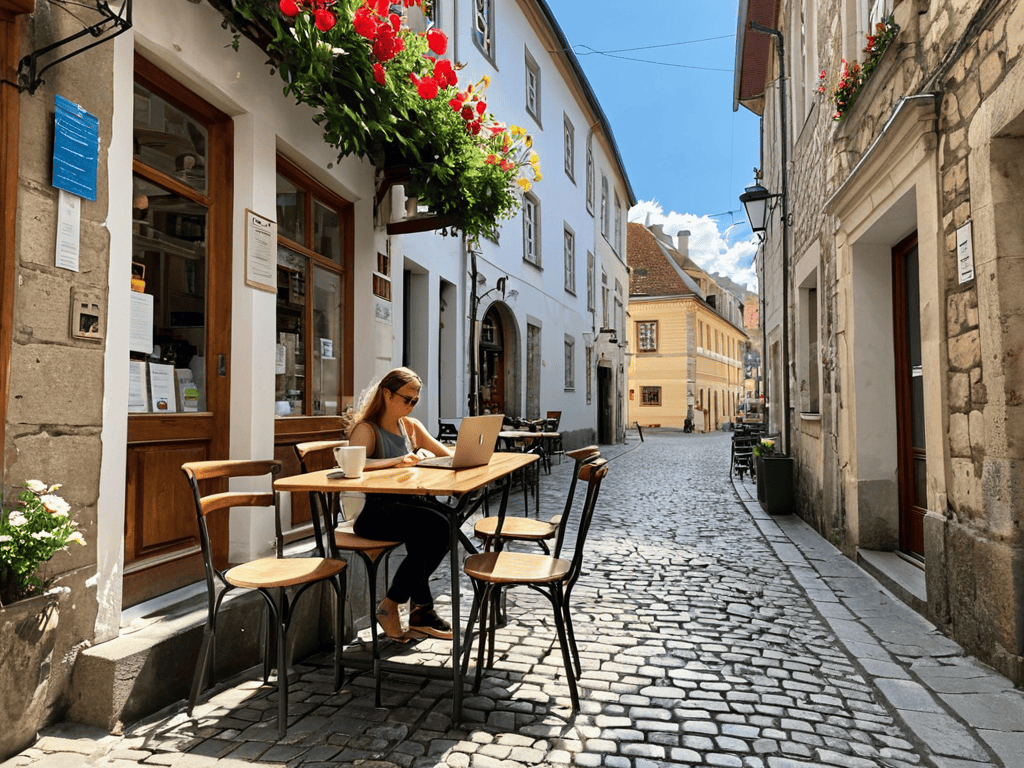I still remember the day I decided to ditch my 9-to-5 job and become a digital nomad, searching for a guide to the best cities for digital nomads in Europe. The excitement was palpable, but so were the doubts – where to go, how to make a living, and how to navigate the complex web of visas and regulations. The common myth that being a digital nomad is all about sipping margaritas on a beach in Bali needs to be debunked – it’s about finding the right balance between work and play in a foreign land.
As you embark on your own journey to find the perfect city to live and work from, I want to assure you that this article will provide you with honest and practical advice on how to make the most of your experience. You’ll learn how to choose the best cities, how to navigate the local culture, and how to stay productive while exploring new horizons. My goal is to give you a no-hype guide to the best cities for digital nomads in Europe, so you can focus on what really matters – living your best life as a remote worker.
Table of Contents
Guide Overview: What You'll Need

Total Time: several days to several weeks
Estimated Cost: $500 – $2000
Difficulty Level: Intermediate
Tools Required
- Laptop (with reliable internet connection)
- Power adapter for Europe (supporting 230 volts and 50 hertz)
- Portable Wi-Fi hotspot (for backup internet access)
Supplies & Materials
- Travel documents (passport, visa, health insurance)
- Comfortable backpack (for carrying essentials while traveling)
- Research materials (guidebooks, maps, and online resources)
Step-by-Step Instructions
- 1. First, define your priorities as a digital nomad – are you looking for a city with a thriving expat community, or do you prefer a more off the beaten path experience? Consider what you need to thrive in a new environment, whether that’s a strong Wi-Fi connection, a vibrant cultural scene, or access to outdoor activities.
- 2. Next, research the visa requirements for each country on your list – some European nations offer digital nomad visas that make it easy to live and work there, while others may have more complex or restrictive requirements. Make sure you understand the rules and regulations before making a decision.
- 3. Now, start exploring the different cities that fit your criteria – look for co-working spaces, coffee shops, and other hubs where digital nomads tend to congregate. Check out online communities and forums to get a sense of the local vibe and what to expect from daily life in each city.
- 4. Once you’ve narrowed down your options, it’s time to think about the cost of living – how much will it cost to rent an apartment, buy food, and get around in each city? Consider the exchange rate and whether your money will go further in one place versus another.
- 5. Fifth, consider the language barrier – while many Europeans speak English, it’s still important to think about whether you’ll need to learn a new language to get by in your chosen city. Look for cities with language exchange programs or other resources to help you get started.
- 6. After that, think about the work-life balance you want to achieve as a digital nomad – do you want to be in a city with a relaxed atmosphere, or one that’s always on the go? Consider the local culture and customs, and whether they’ll support your goals and lifestyle.
- 7. Finally, plan a trip to your top city or cities – spend some time exploring, meeting other digital nomads, and getting a feel for the place. This will give you a sense of whether it’s the right fit for you, and help you make a more informed decision about where to base yourself as a digital nomad.
Europes Digital Nomad Haven

As a digital nomad, it’s essential to consider the european cities with fast internet when choosing a destination. A reliable and speedy connection is crucial for staying productive and meeting deadlines. Many cities in Eastern Europe, such as Budapest and Prague, offer affordable accommodation for remote workers and a great quality of life.
In addition to fast internet, best coworking spaces in eastern europe are also a vital factor in determining the best cities for digital nomads. These spaces often provide a sense of community and networking opportunities, which can be invaluable for remote workers. Some popular coworking spaces in Europe offer a range of amenities, from high-speed internet to on-site cafes and event spaces.
As you’re exploring the best cities for digital nomads in Europe, it’s essential to stay connected with like-minded individuals who understand the lifestyle. That’s why I always recommend checking out online communities and forums where you can find valuable tips and advice from experienced remote workers. For instance, if you’re looking for a platform to meet new people and make connections, you can try searching for websites that offer local networking events or language exchange programs. One such platform that I’ve found helpful is sexkontakte, which can be a great way to meet new people and expand your social circle while working remotely in Europe.
When planning to work in Europe, it’s also important to research digital nomad visas for europe and understand the tax implications for digital nomads in europe. This can help you navigate the complex landscape of taxes and visas, ensuring that you’re compliant with local regulations and able to focus on your work. By doing your research and choosing a city with a strong expat community, you can set yourself up for success and enjoy the many benefits of being a digital nomad in Europe.
Expat Communities in Western Cities
Western European cities like Amsterdam, Berlin, and Barcelona boast thriving expat communities that make it easy for digital nomads to connect and collaborate. These cities offer a wide range of coworking spaces, networking events, and social activities tailored to remote workers. From language exchange programs to startup accelerators, there’s always something happening in these hubs. You can find like-minded individuals at cafes, coworking spaces, or through online forums and social media groups, making it simple to build a professional and social network.
Fast Internet in Eastern Europe
Eastern Europe is stepping up its game when it comes to fast internet. Countries like Poland, Hungary, and Croatia are boasting some of the fastest connection speeds on the continent. In cities like Warsaw and Budapest, you can easily find coworking spaces with lightning-quick internet, making remote work a breeze. With average speeds of up to 200 Mbps, you can stay productive and connected without any hassle.
From cafes to coworking spaces, Eastern Europe’s digital infrastructure is rapidly improving, making it an attractive destination for digital nomads. Whether you’re working from a quaint cafe in Prague or a modern coworking space in Sofia, you can rely on fast and stable internet to get your work done.
Nailing the Digital Nomad Life: 5 Essential Tips
- Research, Research, Research: Don’t just rely on blogs and forums, talk to people who have been to your desired destination to get the real scoop on cost of living, internet speeds, and community vibes
- Visa Requirements and Red Tape: Understand the legal side of being a digital nomad in Europe, from freelance visas to tax obligations, to avoid any unwanted surprises
- Culture Shock and Adaptation: Be prepared for different work cultures, communication styles, and social norms – it’s not just about the Wi-Fi, it’s about fitting in and enjoying the ride
- Stay Connected, Not Isolated: Join online communities, attend digital nomad events, and find co-working spaces to expand your network and avoid the loneliness that can come with remote work
- Be Flexible and Patient: Things won’t always go as planned – flights get delayed, apartments fall through, and internet connections drop. Learn to roll with the punches and enjoy the journey, not just the destination
Key Takeaways for Digital Nomads in Europe
Wanderlust-friendly cities like Lisbon, Barcelona, and Budapest offer a unique blend of culture, community, and fast internet, making them ideal for remote workers
Eastern Europe stands out for its surprisingly fast and reliable internet connectivity, with countries like Poland and Croatia offering speeds that rival those in Western Europe
From expat communities in Western cities like Amsterdam and Berlin, to the emerging hubs in Eastern Europe, digital nomads have a wide range of options to choose from, each with its own unique character and advantages
Embracing the Digital Nomad Lifestyle

The freedom to work from anywhere is not just a perk, it’s a way of life – and Europe’s vibrant cities are the perfect backdrop for digital nomads to thrive, explore, and create.
A Fellow Digital Wanderer
Embracing the Digital Nomad Lifestyle
As we’ve explored the best cities for digital nomads in Europe, it’s clear that each destination offers a unique blend of culture, community, and fast internet. From the expat communities in Western cities to the hidden gems of Eastern Europe with their reliable Wi-Fi, there’s a place for every kind of remote worker. Whether you’re looking for vibrant city life or a peaceful retreat, Europe has it all. By considering factors like cost of living, language barriers, and quality of life, you can make an informed decision about where to base your digital nomad adventures.
As you embark on your journey, remember that being a digital nomad is not just about location independence, but also about embracing a lifestyle of freedom and flexibility. It’s about pursuing your passions from anywhere in the world and connecting with like-minded individuals who share your vision. So, take the leap, and let the journey begin. With an open heart and mind, you’ll find that the world is full of endless possibilities, and Europe is just the starting point for your next great adventure.
Frequently Asked Questions
What are the most affordable cities in Europe for digital nomads to live and work?
For budget-friendly options, consider Porto, Budapest, or Krakow – they offer a great balance of affordability, culture, and decent Wi-Fi. Rent can be as low as $200-300 per month for a one-bedroom apartment, leaving you more cash for exploring and enjoying the local vibe.
How do I navigate visa requirements and regulations for remote work in different European countries?
Visa vibes can be a total hassle, but don’t worry, I’ve got you covered. Research each country’s specific remote work visa requirements and regulations – some have special programs, like Germany’s ‘Freiberufler’ visa or Portugal’s ‘Non-Habitual Residence’ visa. Stay up-to-date, and consider consulting with embassies or expat groups for the latest scoop.
What are the best coworking spaces and communities for digital nomads in Europe's major cities?
For top-notch coworking spaces, check out WeWork in London, Betahaus in Berlin, and Impact Hub in Amsterdam – they offer awesome communities and fast Wi-Fi. In Barcelona, don’t miss out on Spaces and in Paris, try Le Loft. These spots are perfect for networking and getting work done on the go.



